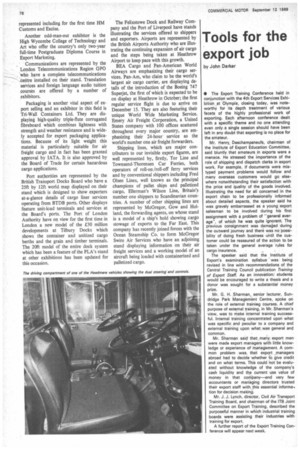Tools for the export job
Page 80

If you've noticed an error in this article please click here to report it so we can fix it.
by John Darker • The Export Training Conference held in conjunction with the 4th Export Services Exhibition at Olympia, closing today, was noteworthy for its depth treatment of various facets of the highly professional work of exporting. Each afternoon conference dealt with a specific theme and no one attending even only a single session should have been left in any doubt that exporting is no place for the amateur.
Mr. Henry. Deschampsneufs, chairman of the Institute of Export Education Committee, said bluntly that amateurs in exports were a menace. He stressed the importance of the role of shipping and dispatch clerks in export work. For example, if documents were mistyped payment problems would follow and many overseas customers would go elsewhere notwithstanding their satisfaction with the price and quality of the goods involved. Illustrating the need for all concerned in the export chain to be professionally informed about detailed aspects, the speaker said he was gravely embarrassed as a young export salesman to be involved during his first assignment with a problem of "general average", of which he was quite ignorant. The previous consignment was damaged during the outward journey and there was no possi bility of doing fresh business until the cus tomer could be reassured of the action to be taken under the general average rules for cargo insurance.
The speaker said that the Institute of Export's examination syllabus was being revised in line with recommendations of the Central Training Council publication Training of Export Staff, As an innovation, students would be encouraged to write a thesis and a donor was sought for a substantial money prize,
Mr. G. H. Sharman, senior lecturer, Sundridge Park Management Centre, spoke on the role of external trainipg courses, A chief purpose of external training, in Mr. Sharman's view, was to make internal training successful. Internal training concentrated upon what was specific and peculiar to a company and external training upon what was general and common.
Mr. Sharman said that many' export men were made export managers with little knowledge or experience of management. A common problem was that export _managers abroad had to decide whether to give credit and on what terms. This could not be evaluated without knowledge of the company's cash liquidity and the current use value of money in that company—and very few accountants or managing directors trusted their export staff with this essential informa, tion for decision making.
Mr. J. J. Lynch, director, Civil Air Transport Training Board, and chairman of the ITB Joint Committee on Export Training, described the purposeful manner in which industrial training boards were assisting their industries with training for export.
A further report of the Export Training Conference will appear next week.




































































































































































































